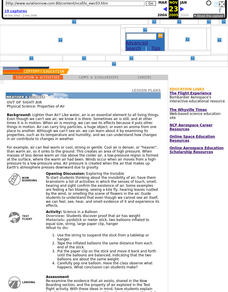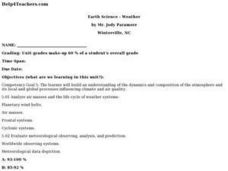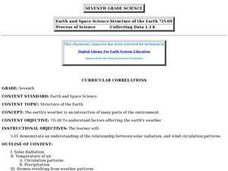Curated OER
Out Of Sight Air; Weather
Fourth graders conduct an experiment to get them thinking about the invisibility of air, and to prove that air has weight.
Curated OER
Wind
Students complete activities to study wind intensity. In this wind study lesson, students discuss wind speed and direction. Students then build a kite and windsock to help them study wind intensity. Students learn to use a wind meter for...
Port Jefferson School District
Climate Patterns
Young climatologists explore the factors that contribute to a region's climate in this two-part earth science activity. To begin, learners are provided with a map of an imaginary planet and are asked to label global wind and...
Curated OER
Hurricanes!
Students access hurricane reports form the national weather service online, and draw hurricane paths. They discuss how hurricanes form and move. The research should be reported in a comprehensive presentation that can be given to a whole...
Curated OER
Everyone Knows It's Windy
Students create an anemometer, an instrument that measures wind speed.
Curated OER
What is Climate?
For this weather worksheet, students identify and explain the factors that can affect the climate in each area of the illustrated map. Then they describe the various effects of these factors, such as air pressure systems and the land...
Chicago Botanic Garden
Climate Change Around the World
It is unknown if cloud cover increases in response to carbon dioxide levels changing, helping climate change slow down, or if cloud cover decreases, allowing Earth to warm faster. Part four in the series of five lessons has classes...
Curated OER
Build Your Own Weather Station
Studens experiment with temperatures. In this science lesson plan, students make their own weather station by heating one bottle and keeping the water in another bottle at room temperature.
Curated OER
Earth Science - Weather
Young scholars build an understanding of the dynamics and composition of the atmosphere and its local and global processes influencing climate and air quality. They analyze air masses and the life cycle of weather systems.
Curated OER
Warm and Cold Air
Students examine what happens to air when it is heated or cooled. They conduct an experiment using bottles and balloons, record and discuss their observations, and write a hypothesis.
Curated OER
Earth's Weather
Seventh graders learn how solar radiation, latitude, and other factors affect weather. They break into six groups and are assigned a topic to research and to present their findings orally.
Curated OER
Weather Myths
Fourth graders relate myths to weather phenomenon. They write and illustrated a weather myth and present it to the class.
Curated OER
Weather Station Report
In this science worksheet, students fill out the data report for the seven different questions. The focus is upon the interpretation of data.
Curated OER
Weather Art in Space Settlements
Students demonstrate a cloud formation and the relation between pressure and temperature in gases. They explain how clouds could be created in space settlements and see the relation between pressure and temperature in gases.
Curated OER
Windy Weather
Make wind detectors with paper plates, ribbon, and streamers. Go for walks over an extended period of time to observe and record the effect of the wind on the detectors and other observable objects (leaves, grass, etc.).
Curated OER
What's Up With Updrafts?
Students demonstrate how hail and rain are suspended in the air during a storm. In this lesson on storms and weather, students use a hair dryer and ping pong ball to demonstrate how hail and rain can be suspended in the air during a storm.
Curated OER
Cold Front Characteristics
Students study weather characteristics of a cold front passage. They view animations of several atmospheric variables (e.g., temperature, rainfall) during a cold front passage and locate the front, determine its direction of movement,...
Curated OER
Weather
Students track wind speed and direction, barometric pressure, air temperature, and precipitation for a month using a newspaper. They chart the data over a months time.
Curated OER
Cyclones
Students explore Earth science by researching natural disasters in class. For this cyclone lesson, students discuss the creation of cyclones and what their potential destruction can be in the wrong environment. Students read assigned...
Curated OER
Surface Meteorological Observation System (SMOS)
Students investigate local surface weather conditions. They log weather conditions for thirty days, develop a graph, plot cloud cover, and compare/contrast the graphed lines of various weather factors.
Chicago Botanic Garden
Climate Change Around the World
You know climate change is happening when you see a bee take off its yellow jacket. Part four in a series of five lessons explores all factors affecting climate change: temperature, cloud cover, precipitation, and carbon dioxide. By...
Curated OER
Updrafts in Action
Students examine how wind can suspend rain and hail in clouds. They focus on safety precautions they can take to protect them from the hazards of thunderstorms.
Curated OER
Surface Meteorological Observation System (SMOS)
Young scholars monitor local surface weather conditions for at least 30 days. They interpret the data by graphing it and detemining percentages.
Curated OER
Meteorology
Seventh graders examine the job of meteorologists. They decide which characteristics of the atmosphere that meteorologists focus on. They use local weather maps from newspapers to predict weather in their area.

























